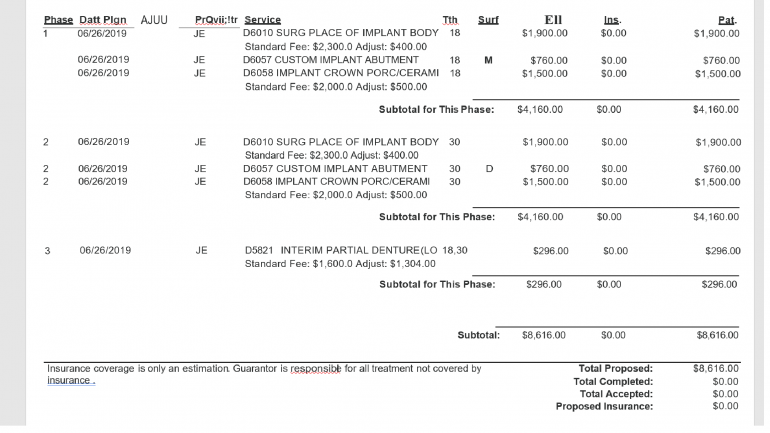
Dental Code D0120: Periodic oral evaluation - established patient
Dental code D0120 is a critical component of dental care for established patients. It specifically refers to the periodic oral evaluation performed by dentists. This code allows dental professionals to assess the oral health status of their patients during routine check-ups, enabling them to identify any changes or developments in dental conditions since the patient's last visit.
Dental code D0120 Price Range
On average, patients pay $55 for this D0120 service at the dentist's office, with as little as $40 charged for this in less expensive cities and as much as $80 in more expensive cities.
Low cost of living | Medium cost of living | High cost of living |
Memphis (Tennessee), Cincinnati (Ohio) | Miami (Florida), Denver (Colorado), Austin (Texas) | (New York (New York), San Francisco (California) |
$40 | $55 | $80 |
However, the price for the service D0120 depends not only on the region where you live, but also varies from dentist to dentist. Therefore, it makes sense to compare prices before choosing a dentist. The best way to do this price comparison is at Dr. BestPrice and save a lot of money.
What does the code mean?
Dental code D0120 refers to the periodic oral evaluation of established patients. It is used to describe the comprehensive assessment of a patient's oral health during routine check-ups. This evaluation allows dentists to monitor any changes or developments in the patient's dental condition since their last visit.
Detailed information about the procedure and the steps of the whole process:
Patient Assessment
The first step in a periodic oral evaluation (D0120) involves gathering relevant information about the patient's medical and dental history. The dentist reviews any existing dental records, including X-rays, previous treatment plans, and progress notes. They also inquire about any recent changes in the patient's overall health, medications, or habits that might impact their oral health.
Extraoral Examination
During the extraoral examination, the dentist evaluates the patient's face, neck, and temporomandibular joint (TMJ) for any abnormalities or signs of dysfunction. They assess the symmetry of the face, palpate the lymph nodes, and check for signs of inflammation, tumors, or other abnormalities.
Intraoral Examination
The intraoral examination is a crucial aspect of the periodic oral evaluation. It involves a thorough examination of the oral cavity, including the teeth, gums, tongue, palate, and other oral structures. The dentist looks for signs of dental caries (cavities), gum disease, oral lesions, or any other abnormalities. They may use dental instruments, mirrors, and intraoral cameras to aid in their examination. During the intraoral examination, the dentist carefully inspects the teeth for any signs of decay, such as discoloration, cavities, or enamel erosion. Additionally, they assess the health of the gums, checking for inflammation, bleeding, or signs of periodontal disease. The examination also involves evaluating the tongue, palate, and other soft tissues for the presence of ulcers, lesions, or any other abnormalities that may require further investigation or treatment. By utilizing advanced tools like intraoral cameras, dentists can capture detailed images and magnify specific areas for a more accurate diagnosis.
Periodontal Assessment
Assessing the health of the gums and supporting structures is an integral part of the periodic oral evaluation. The dentist evaluates the periodontal tissues for signs of gingivitis (gum inflammation) or periodontitis (gum disease). They measure the depth of periodontal pockets, assess gum recession, and check for bleeding or signs of infection. This assessment helps determine the patient's periodontal health status and guides appropriate treatment interventions if necessary. During the periodontal assessment, the dentist may also perform a comprehensive examination of the bone structure surrounding the teeth. This involves evaluating the levels of bone loss or any signs of bone abnormalities, which can indicate the presence of advanced periodontal disease. Additionally, the dentist may assess the patient's bite and occlusion, looking for any signs of misalignment or bite-related issues that can impact the overall health of the periodontal tissues. By conducting a thorough periodontal assessment, the dentist can identify early signs of gum disease and develop targeted treatment plans to manage and improve the patient's periodontal health.
Dental Charting:
Dental charting involves recording the condition of each tooth in the patient's mouth. The dentist notes any existing dental restorations, such as fillings, crowns, or bridges, and identifies any areas of decay or damage. They may use a dental probe and radiographs to assess the integrity of the tooth structure and identify any hidden dental issues.
Oral Cancer Screening:
Periodic oral evaluations often include an oral cancer screening. The dentist examines the oral tissues, including the lips, tongue, cheeks, and throat, for any suspicious lesions or abnormal changes. Early detection of oral cancer significantly improves the chances of successful treatment.
Treatment Planning and Patient Education:
Based on the findings of the periodic oral evaluation, the dentist develops a personalized treatment plan for the patient. This may include recommendations for preventive measures, such as fluoride treatments or sealants, as well as restorative or periodontal treatments. The dentist also educates the patient about their oral health status, discusses any necessary lifestyle changes, and provides oral hygiene instructions to improve their dental care routine.
Summary of dental code D0120
Dental code D0120 represents the periodic oral evaluation of established patients and is an essential part of maintaining optimal oral health. This comprehensive assessment involves various steps, including patient assessment, extraoral and intraoral examinations, periodontal assessment, dental charting, oral cancer screening, and treatment planning. By regularly performing D0120, dentists can identify potential issues early on, develop appropriate treatment plans, and educate patients about maintaining good oral hygiene practices. Regular periodic oral evaluations are key to preventing dental diseases, promoting oral health, and ensuring the overall well-being of patients.
Find the best prices for dental treatments with Dr. BestPrice.
